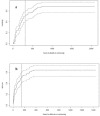Continuous Positive Airway Pressure in Elderly Patients with Severe COVID-19 Related Respiratory Failure
- PMID: 35956070
- PMCID: PMC9369612
- DOI: 10.3390/jcm11154454
Continuous Positive Airway Pressure in Elderly Patients with Severe COVID-19 Related Respiratory Failure
Abstract
The elderly population represents a high percentage of patients hospitalized for COVID-19 pneumonia and severe respiratory failure, for whom CPAP may be a treatment option. The aim of this study was to describe the CPAP support modalities and to explore factors associated with CPAP failure. In this retrospective study, 110 consecutive patients aged ≥ 75 years were enrolled. Median frailty score, baseline partial arterial pressure of oxygen to fraction of inspired oxygen ratio (P/F), and respiratory rate (RR) were 5, 108, and 30 cycles/min, respectively. Of the 110 patients that began CPAP treatment, 17 patients died within 72 h from baseline, while in 2 patients, CPAP was withdrawn for clinical improvement. Thus, of the 91 patients still on CPAP at day 3, 67% of them needed continuous CPAP delivery. Patients with RR ≥ 30 and with frailty score ≥ 5 had an odds ratio of continuous CPAP needing of 3 and 4, respectively. Patients unable to tolerate CPAP-free periods demonstrated higher mortality risk as compared to those able to tolerate intermittent CPAP (OR: 6.04, 95% CI 2.38−16.46, p < 0.001). The overall in-hospital mortality was 63.6%. Delirium occurred in 59.1%, with a mortality rate in this subgroup of 83.1%. In a time-varying Cox model, the hazard ratio of death was 2.9 in patients with baseline RR ≥ 30 cycle/min, 2.4 in those with baseline P/F < 100. In the same model, the hazard ratio of death was 20 in patients with delirium and a frailty score < 5 and 8.8 in those without delirium and with frailty ≥ 5, indicating a competitive effect between these two variables on the death risk. Conclusions: Respiratory impairment, frailty, and delirium predict treatment failure, with the latter two factors demonstrating a competitive effect on mortality risk. CPAP support may represent a feasible therapeutic option in elderly patients, although chances of a therapeutic benefit are markedly reduced in case of severe respiratory impairment, very frail baseline condition or delirium occurrence.
Keywords: COVID-19; CPAP; continuous positive airway pressure; elderly; ventilation.
Conflict of interest statement
The authors declare no conflict of interest.
Figures


References
-
- Wang D., Hu B., Hu C., Zhu F., Liu X., Zhang J., Wang B., Xiang H., Cheng Z., Xiong Y., et al. Clinical Characteristics of 138 Hospitalized Patients with 2019 Novel Coronavirus-Infected Pneumonia in Wuhan, China. J. Am. Med. Assoc. 2020;323:1061–1069. doi: 10.1001/jama.2020.1585. - DOI - PMC - PubMed
-
- Santus P., Radovanovic D., Saderi L., Marino P., Cogliati C., De Filippis G., Rizzi M., Franceschi E., Pini S., Giuliani F., et al. Severity of Respiratory Failure at Admission and In-Hospital Mortality in Patients with COVID-19: A Prospective Observational Multicentre Study. BMJ Open. 2020;10:e043651. doi: 10.1136/bmjopen-2020-043651. - DOI - PMC - PubMed
-
- Yang X., Yu Y., Xu J., Shu H., Xia J., Liu H., Wu Y., Zhang L., Yu Z., Fang M., et al. Clinical Course and Outcomes of Critically Ill Patients with SARS-CoV-2 Pneumonia in Wuhan, China: A Single-Centered, Retrospective, Observational Study. Lancet Respir. Med. 2020;8:475–481. doi: 10.1016/S2213-2600(20)30079-5. - DOI - PMC - PubMed

